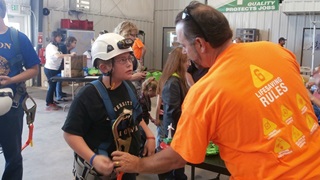Finding joy in teaching, learning and discovering
Colorado’s Keystone Science School makes STEM education exciting and relevant
It’s about science, adventure and fun.
And for teachers heading back to school this fall, it’s about renewed energy in the classroom.
For 40 years, the Keystone Science School has inspired curiosity and critical thinking, while making science exciting and relevant in the classroom.
Here on this 23-acre campus, perched at an altitude of 9,200 feet in Colorado’s Snake River Valley, the school has taught scientific principles and leadership skills to students, campers, educators and community members—combining classroom lessons with outdoor, hands-on field experiences in a natural mountain environment.
“We believe that by exploring the world through science, we can inspire curiosity—which, in turn, can change lives and build stronger communities,” says Colleen Hoffman, associate director of the KSS educator program. “Ultimately, we’re working to create future leaders who can work together to solve problems in a world that’s constantly changing.”
With modern log house-style dorms, an outdoor amphitheater, and a state-of-the-art observatory, Keystone Science School is the ultimate outdoor laboratory.
“We work to create engaged citizens, inspire leadership and nurture critical thinking skills. We keep it fun and engaging by asking lots of questions, and getting participants outside and hands-on in seeking solutions,” says Ellen Reid, KSS executive director. “We’re academic. But we’re never boring.”
Educator programs are an integral component of KSS offerings. The Key Issues Institute, focused on teacher professional development, features curricula aligned with STEM (science, technology, engineering and mathematics) concepts and national education standards
These week-long summer sessions in the Rocky Mountains use a fresh approach to learning about science, and its relationship to decision-making—helping educators learn to explore contentious issues in the classroom, while keeping their own biases out of the lesson.
Workshops cover a variety of activities, including:
- GPS navigation and topographic mapping;
- Water testing and issue investigation; and
- Working together, representing various interests, to create a solution for the issue that the group has spent the week investigating.
“Research shows that a teacher who is both motivated and confident in what she is teaching will have a huge impact on student achievement,” says Hoffman. “The Key Issues Institute helps teachers gain confidence in teaching STEM subjects—especially in the context of current events—that can be exciting and relevant for their students.”
With 30 teachers per workshop, there’s potential to reach thousands of students each year with innovative STEM education—and over the past 13 years, Enbridge community investment grants have sponsored 94 teachers from across the U.S. to attend the school’s Key Issues Institute professional development sessions in Colorado.
This summer, nine teachers from Texas, North Dakota, Louisiana and Wisconsin attended week-long Keystone Science School sessions in June and July through Enbridge sponsorships.
“These teachers are working with our future leaders,” says Cindy Finch, a senior advisor of public affairs with Enbridge. “Some day, those leaders will make decisions affecting our society, our environment and our resources. The earlier they can make educated decisions based on critical thinking, the better.”










